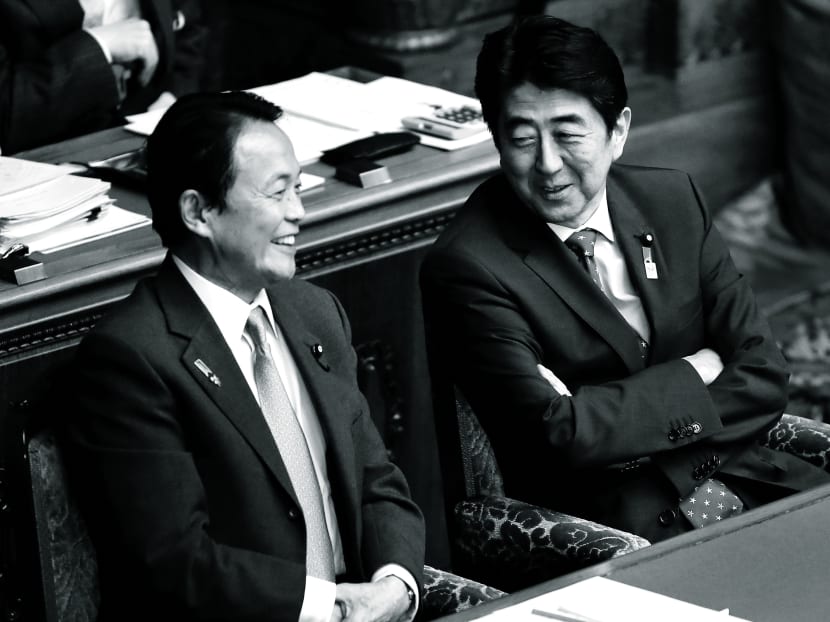Abe’s right to take from old, give to young
One objection to “Abenomics”, the reflationary creed adopted by Japan’s new government, is that it will erode hard-earned savings. Instead of simply grabbing them over the weekend — as has become fashionable in certain parts of Europe — the government hopes to siphon them off gradually through gentle inflation.

It will be no laughing matter for Mr Taro Aso (left) and Mr Shinzo Abe if the government’s reflationary policies fail to breathe new life into Japan’s economy. Photo: Bloomberg
One objection to “Abenomics”, the reflationary creed adopted by Japan’s new government, is that it will erode hard-earned savings. Instead of simply grabbing them over the weekend — as has become fashionable in certain parts of Europe — the government hopes to siphon them off gradually through gentle inflation.
This is a dastardly plan. It is unlikely to prove popular with the over-60s, who make up a quarter of Japan’s population, but who control two-thirds of its vast household assets. It is a good idea all the same.
The reason for welcoming this intergenerational theft is that, for 20 years, Japan has prioritised the interests of older generations over younger ones.
That is not only unfair. Penalising youth is also not the best way to build a nation’s future. Taxing the old through inflation is one way to redress what has been a long squeeze of one generation by another.
YOUTH UNEMPLOYMENT
Most of the squeezing has taken place in the workplace. The pre-bubble generation, those who got jobs before the 1990 asset-price crash, had a fairly straightforward path to prosperity.
After negotiating “exam hell”, they proceeded to good universities and from there to big companies that would recruit them straight after graduation. In return for life long loyalty, employees would be given a job until retirement with ascending seniority and pay.
This happy system was not for everyone. Even in the fast-growth decades, the lifetime employment model only covered about 30-40 per cent of employees. But its creed spread further. In 1990, just one in five employees was classified as non-permanent.
That all changed when the bubble burst. As companies paid back debts and slowly reined in expenses to match reduced revenue prospects, they cut costs. Naturally, there were some lay-offs. But in Japan, far fewer workers lost their job than in societies with more flexible labour laws and less sense of loyalty to existing employees.
Thus, those who bore the brunt of restructuring were Japan’s youth, who were simply not hired by big companies but shunted into casual work. As a result, about 35 per cent of workers are now casual or part-time.
Such jobs are held overwhelmingly by younger workers and women. Youth unemployment is more than twice the national average at about 10 per cent.
BURDEN WITH NO PAYOUT
Dimmer employment prospects for young people have not been the only problem. Younger workers have been expected to contribute more than today’s retirees to the state pension.
To add insult to injury, this will pay out less.
Many younger people have opted out altogether. Having taken a look at Japan’s finances — chronic fiscal deficits and gross public debt at 230 per cent of output — they have concluded there may be no payout at all when they retire.
Deflation has been the main culprit in Japan’s 20-year economic drama. But, ironically, it has also been the saviour.
Part-time workers may get miserable wages, but that is not so bad when prices are back at 1990 levels. Interest rates on savings are derisory but they provide a positive return when measured against falling prices. The government too may have a huge debt but it is easily serviced when 10-year Japanese government bonds yield less than 1 per cent.
Japan’s households own about US$12 trillion (S$15 trillion) of net assets, a little less than the government’s gross debt, and considerably more than its net debt.
Since more than 90 per cent of public debt is owned by Japanese, the problem is more about distribution of pain than risk of default.
One way of looking at Japan’s debt is as deferred tax. Instead of paying tax, Japanese savers have lent money to the government so that it can spend more than it can raise in (deflationary suppressed) revenue.
PARASITE SINGLES
Now the government could tax workers directly through higher income tax or indirectly through higher corporate tax. But that seems unfair since younger people have already paid a price through reduced opportunity and earnings potential.
Alternatively, the government could tax those who accumulated wealth in the good years. Inflation is one way of doing that. So is inheritance tax. And indeed, the government plans to raise estate tax from 50 per cent to 55 per cent.
The intergenerational conflict is not as stark as the above analysis makes it sound. In practice, younger people with less well-paid jobs often live with their parents. There is even a term for it — parasite singles.
Grandparents indulge their grandchildren by running down their savings to pay for luxuries or education, a pattern now being encouraged with tax exemptions on some intergenerational transfers.
Generational rebalancing can go too far. Mr Taro Aso, the 72-year-old Finance Minister, recently joked that old people should “hurry up and die” so that they did not drain the public purse. Such horrible insensitivity aside, robbing retirees to pay for the next generation is no panacea.
More must be done, too, to shift money from cash-hoarding companies to cash-hungry households. Productivity must also be raised. Indeed, Prime Minister Shinzo Abe’s plans could come unstuck if wages — stagnant or falling for years — fail to keep pace with hoped-for inflation.
Still, part of the point of moving from deflation to inflation is to help tomorrow’s earners and wealth creators. If Japan’s savers have to lose a little in the process, so be it.
ABOUT THE AUTHOR:
David Pilling is the FT’s Asia editor.






